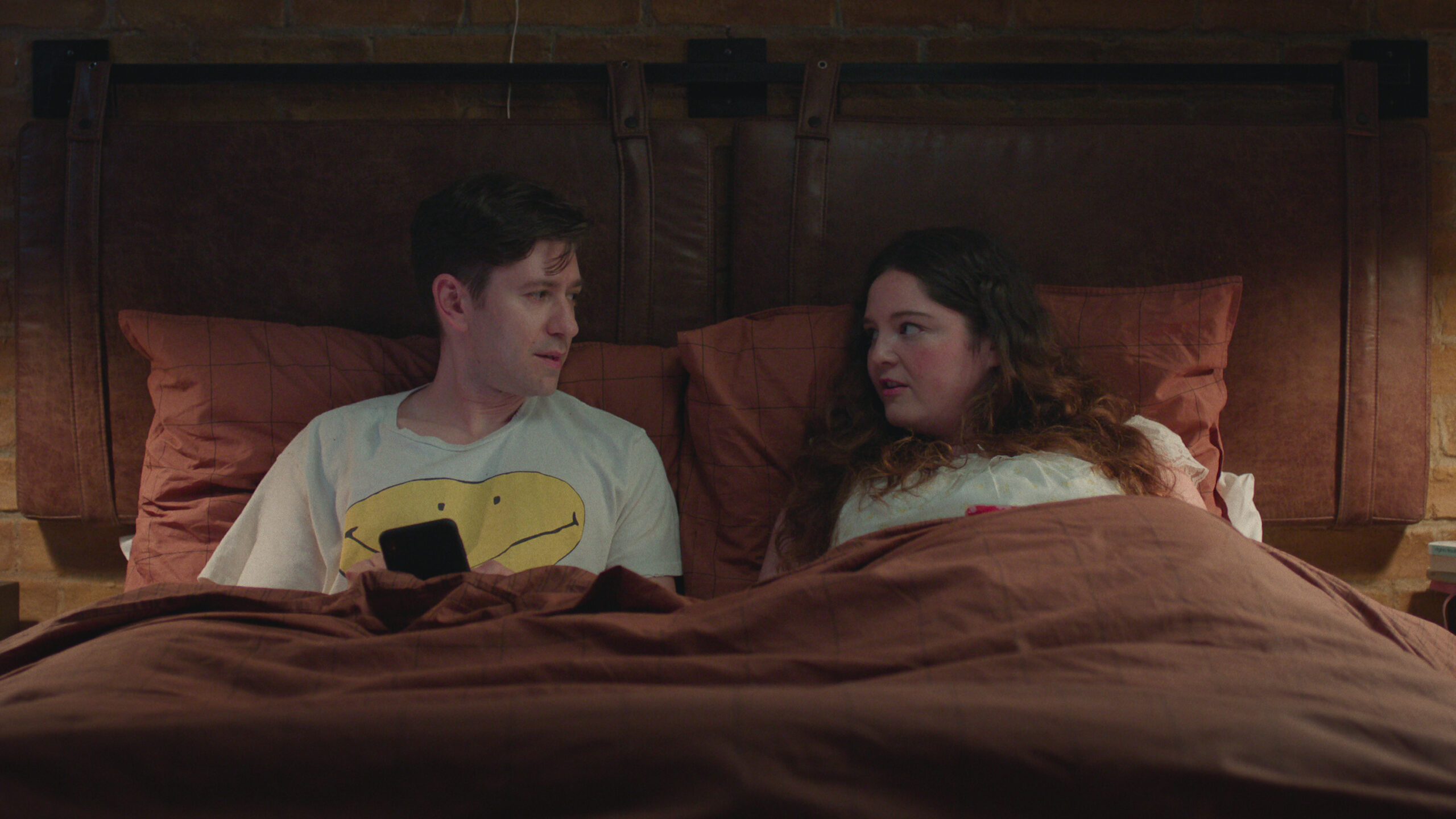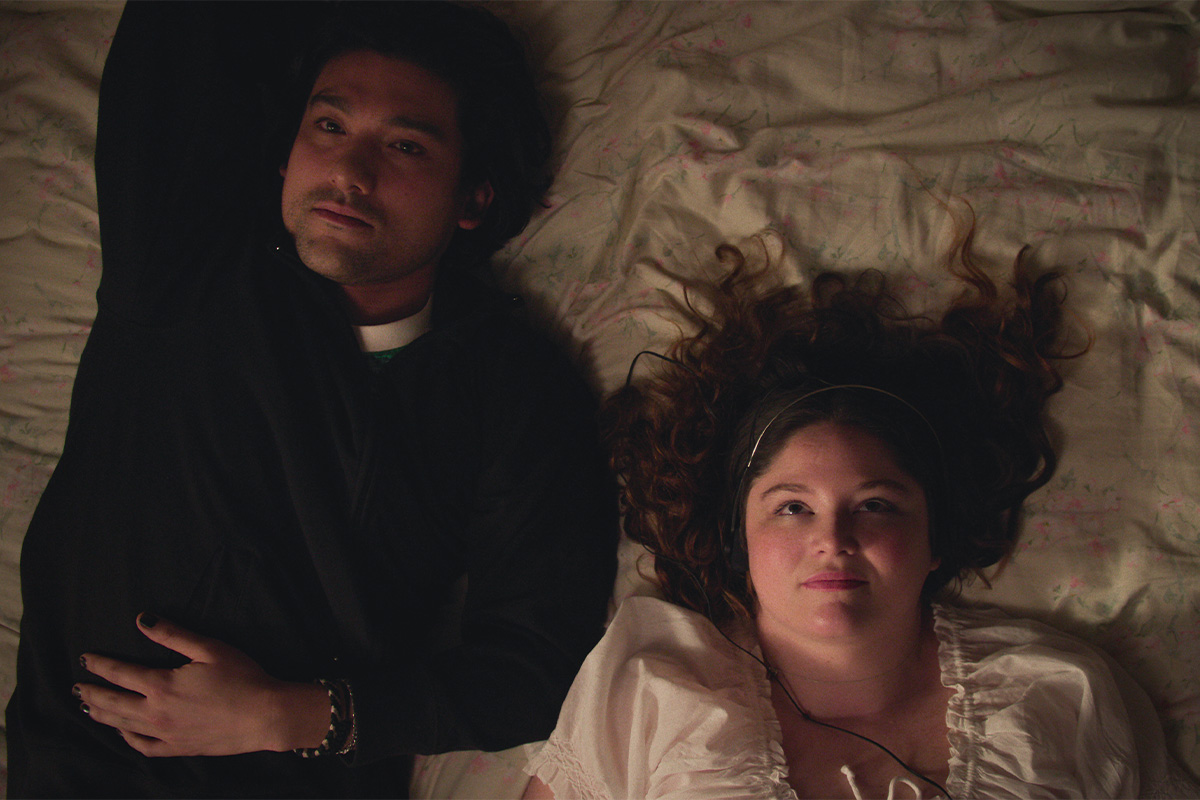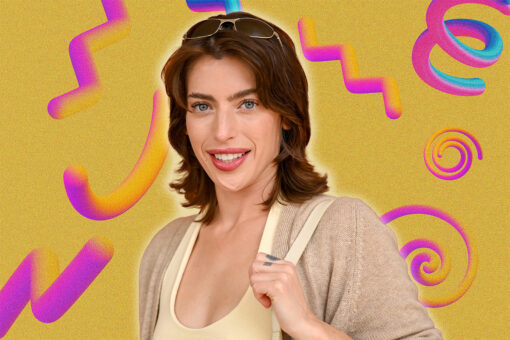Editorial note: Spoilers ahead for Netflix’s “Too Much.”
In episode three of Lena Dunham’s new show “Too Much,” protagonist Jess (Megan Stalter) is staying up all night with her very new boyfriend Felix (Will Sharpe). Jess has just moved from New York to London ostensibly for a new job. But in reality, the move is to escape her ex-boyfriend Zev (Michael Zegen) and his new fiancée, Wendy Jones (Emily Ratajkowski), and to get out of the house Jess is currently living in with her grandma Dottie (Rhea Perlman), mom Lois (Rita Wilson) and sister Nora (Lena Dunham).
Jess and Felix’s sleepover is part “Paddington” watch party, part sex marathon, part Jess obsessively watching Wendy’s social media, part opportunity for the very fresh couple to get to know one another.
At one point late into the night, Jess’ mom tries to FaceTime her while she and Felix are in bed. “I mean, if you’re talking that much, she’s really not giving you a chance, is she?” Felix asks Jess after she rejects the call. “I think with British families it’s more like birds. They boot you out the nest the second you don’t need your worms [chewed].”
“Well, Jewish women are like clothespins,” Jess responds. “It hurts when they attach themselves to you.”
I’ve been thinking about that line ever since I got screeners for “Too Much” in May. As a capital “J” Jewish woman, particularly one who writes about culture, I am more than aware of the conversations around cultural depictions of Jewish women. It’s impossible to engage with extremely popular shows like “The Marvelous Mrs. Maisel” or “Nobody Wants This” without also engaging with the idea that their Jewish women characters are stereotypically overbearing, meddling and tribalistic. Hearing what is, at face value, a generalizing critique of Jewish women in what is likely to be another highly-watched Netflix show made a part of me shrink back.
But weirdly, I also felt pulled in by that line. I resonate with the painful paradox of Jewish women being too close and too much for the ones they love most. Not because I see that in myself, or how Jewish women are as a whole, but rather because that is who I have been told I am. I feel it time and again, from cultural representation to social media and largely from men.
I think Jess is the same way.
When we first meet Jess, it’s clear that she’s not OK in the wake of her break-up with Zev. She’s self-deprecating, desperate for affirmation and clearly traumatized. She inches away from crisis at all times, whether that’s accidentally setting her nightgown on fire or getting too high on ketamine. Her authentic self — genuine, loving, quirky and bright — peaks through the haze at various moments. But it’s clear that for some reason, Jess has lost that version of herself. “If I just toned it down or if I just speak when spoken to, or just behave in general,” she laments in the second episode, “I could keep [crisis] at bay.”
In the halfway point, the episode “Pink Valentine,” we finally learn why. It’s not just that Zev and Jess broke up. It’s that Zev Jeremiah Goldstein, the Pitchfork writer whose bar mitzvah theme was Weezer, the kind of guy who probably thinks of himself as a Nice Jewish Boy, hated Jess and her strong sense of self so much throughout their relationship. And through his hatred, Jess learned to hate herself, too.
First, it was little things, like Zev saying she has too many pink things when they move in together or diminishing her love of pop artists like Miley Cyrus. Over time it grew into Zev putting her career down, saying her work as a producer for commercials makes way for “real artists.” The contempt continued in making Jess get rid of her dog Cutesie and openly flirting with Wendy in front of her.
His hatred curdles and explodes when he forces Jess into breaking up with him, throwing in some verbal abuse for good measure. At the same time, she also tells him that she’s pregnant. Yeah, Zev apathetically agrees, she should probably get an abortion. “You’re one of those guys who thinks that he wants a strong woman, who loves all the bright big things about her, but you fucking don’t,” Jess tells Zev after he self-pityingly remarks that he knew he’d be alone for Hanukkah this year.
“I used to feel so special about me,” she breaks down in sobs. “And I really don’t [anymore].”

It’s a horrifying scene, followed by the equally shattering sequence in which Jess gets an abortion all by herself. And it’s with this knowledge that we can conclude that Zev hates women. But within that is a specific animus for specific women. “My mom Sharon is a classic,” Zev tells a new therapist in the opening to episode eight. “You know, that typical Jewish mother who loves you so much that by the time you’re 19 you haven’t learned to turn a fucking washing machine on. The kind of mom that tucks in your shirt and zips up your pants and wipes food off your face with her own spit.”
“And when she’s loving you and feeding you and covering you in blankets that you don’t really need or ask for, well, it feels like love,” he goes on. “But it comes at a price. Because to get that love, I have to tell Sharon, or we all have to tell our own Sharons, that I love her best of all. That no one can compare.”
We as an audience never meet Sharon. She very well might be abusive, or at the very least, have a complex relationship to her son. But we see her only through the gaze of a man who called his then pregnant girlfriend a “fucking cunt.” So I feel more inclined to believe that Zev is so uninteresting and small that he cannot stand anyone who feels and thinks deeply, even if it’s his mother in her devotion to him, overbearing or not. It is because Zev clearly wholesale buys into the stereotypes about Jewish women and Jewish mothers, and that at the root of that trope is a strong will, that Zev must hate Jewish women most of all. And so we find Jess in episode three saying, “Jewish women are like clothespins,” an expression which encapsulates just how needy and suffocating she’s been made to feel all these years.
Still, I don’t want to discount Jess’s own intricate relationship with her mother, sister and grandmother. The Salmon women are deeply close, so much so that they have few boundaries with one another. They know the details of each other’s lives to an inappropriate degree. Even Jess, like Zev, blames her mother for her problems, telling her over FaceTime at one point that she never showed her healthy love to emulate. When Jess says these Jewish women are like clothespins, I believe her.
But is this specifically because Dottie, Lois and Nora have been born into the cultural context of Jewish womanhood? On the one hand, it seems manufactured by circumstance. Grandma Dottie overshares because all her friends are dead. Lois is over-bearing and not the best model of love because her husband died of Parkinson’s 30 years prior. And Nora is just generally struggling because her husband Jameson (Andrew Rannells) recently left her to live in a Bushwick loft and be in a poly relationship with two people named Cody. On the other hand, perhaps the Salmon women act in ways that are too much because, like Jess, they have been told that’s who they are.
By the final episode of “Too Much,” I’m not sure that Jess would have the same thoughts about Jewish women. She sees herself differently now. Through her relationship with Felix, finding common ground with Wendy and her own sheer will, it’s clear that she’s able to find herself again.
“You’re not allowed to call me a bitch!” she defends herself to Felix during a fight. “I’m good! I’m not a bitch! I’m good. I’m special and I’m bright.”
Jess is not unflawed. She might still inadvertently cause Felix pain in their relationship. But now she knows that she’s good. In finally mustering the ability to let go of her pain, we see Jess, in her mind’s eye, enter the old apartment she shared with Zev. She caresses his face as he reads “The Love Affairs of Nathaniel P.,” a book about a Jewish writer who both thinks highly of himself and treats the women he dates with disdain.
The brilliance of “Too Much” is its combination of sharp humor and its tenderness towards Jess, even as she imperfectly heals. It offers an antidote to the insidious, misogynistic ways in which Jewish women are taught to think about ourselves; whether it’s that we are particularly bad or manipulative, or just too much. Instead, being too much, like the more positive British connotation of the phrase, becomes power. Coming from Lena Dunham, herself a Jewish woman who knows what it is to be highly perceived and judged and diminished, this is made all the more meaningful.
If we’re doing any generalizing, perhaps it’s better to say that Jewish women are like “Too Much.” We are all shades of bright, painful, funny, sharp, tender, opinionated, imperfect and, most importantly, just right.
“Too Much” is now streaming on Netflix.



